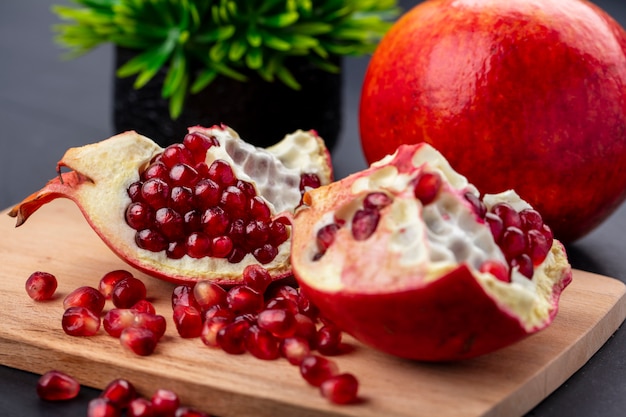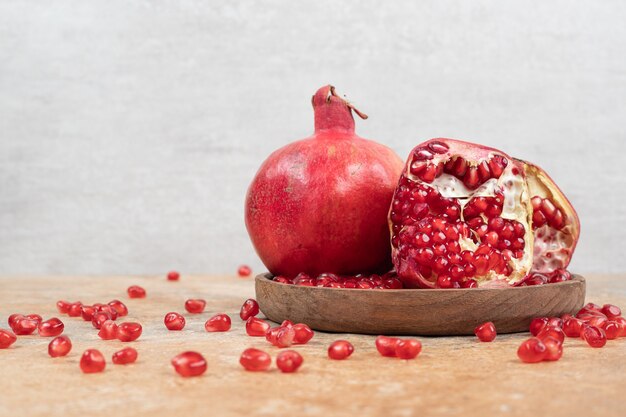Pomegranate: The Fruit of Legends

Key Takeaways Shortly
- Pomegranate is celebrated globally as the "king of fruits" due to its rich history and versatile culinary uses.
- In Ayurveda, pomegranate holds significant cultural importance and is utilized for its healing properties.
- This fruit offers numerous health benefits, including boosting heart health and improving memory, thanks to its rich nutrient profile.
- Pomegranates are a top source of antioxidants, which play a crucial role in protecting your health.
- There are various ways to enjoy pomegranates, whether fresh, juiced, or as part of a dish, making it easy to incorporate into your diet.
Pomegranate has earned its crown as the "King of Fruits." This jewel-toned fruit is not only delicious but also holds a special place in Ayurveda, where it's valued for its impressive health benefits. Packed with antioxidants, pomegranate works wonders in boosting health and wellness. In this article, we'll explore intriguing facts and insights about this mighty fruit. From its deep roots in traditional medicine to its modern-day applications, we'll uncover why pomegranate deserves its regal status. So, if you're curious about what makes this fruit so extraordinary, stay with us for a fascinating journey into the world of pomegranates.
Pomegranate in Ayurveda
In Ayurveda, pomegranate is seen as a powerful fruit with numerous health benefits. This ancient system of medicine from India values pomegranate for its balancing properties. Here's why:
-
Dosha Balancing: Pomegranate is known to balance the three doshas: Vata, Pitta, and Kapha. This makes it a versatile fruit for different body types.
-
Digestive Aid: Ayurvedic practitioners recommend pomegranate for improving digestion. The fruit's natural enzymes help break down food, making it easier to digest.
-
Heart Health: Pomegranate is believed to support heart health. Its antioxidant-rich juice can help maintain healthy blood circulation and reduce the risk of heart problems.
-
Blood Purifier: In Ayurveda, pomegranate is said to purify the blood. This supports overall health and vitality, keeping the body free from toxins.
-
Cooling Effect: The fruit is considered cooling, making it ideal for reducing heat in the body. This can help soothe conditions associated with excess heat, like inflammation.
Ayurveda emphasizes the importance of whole foods, and pomegranate fits perfectly into this philosophy. Its vibrant seeds and juice are not just delicious but provide a natural way to enhance well-being.

Health Benefits of Pomegranate
Pomegranates are not just tasty; they pack a punch when it comes to health. This fruit, known for its jewel-like seeds, is loaded with antioxidants. In fact, they have three times more antioxidants than green tea. These antioxidants help protect your body from free radicals, which are harmful molecules that can lead to cell damage.
One of the standout benefits of pomegranates is their impact on heart health. Regular consumption can help lower blood pressure, reducing the risk of heart disease. Studies show a significant decrease in blood pressure in people who drank pomegranate juice daily. This makes it a heart-friendly choice for many.
Pomegranates also have anti-inflammatory properties. Chronic inflammation can lead to diseases like diabetes and obesity. The antioxidants in pomegranates can help reduce this inflammation. Eating pomegranates or drinking the juice might keep these conditions at bay.
Another exciting benefit is related to memory. Some studies suggest that pomegranate juice may improve memory in older adults. This could be due to the high levels of antioxidants, which protect the brain from oxidative stress.
Pomegranates are also known to support joint health. They may help reduce symptoms of arthritis. The fruit contains plant compounds that can block enzymes that cause joint pain and damage. This makes it a natural remedy for those suffering from arthritis.
Including pomegranate in your diet can be a delicious way to boost your health. Whether you enjoy them as a snack, juice, or in a salad, you're adding a nutritious powerhouse to your meals.

Antioxidant Powerhouse
Pomegranates aren't just tasty; they're loaded with antioxidants. These tiny warriors help protect our cells from damage. Did you know that pomegranates have more antioxidants than red wine and green tea? That's quite a punch! Antioxidants are known to fight off harmful molecules called free radicals, which can lead to diseases.
One of the main antioxidants in pomegranates is punicalagin. It's found in both the peel and the juice and is responsible for many of the health benefits. Punicalagin has anti-inflammatory properties, making it helpful in reducing inflammation in the body. This can be particularly beneficial for those suffering from arthritis or other inflammatory conditions.
A study published in the Journal of Agricultural and Food Chemistry found that pomegranate juice has a higher antioxidant activity than other fruit juices. This means it may be more effective at protecting our cells. Including pomegranates in your diet could support heart health, improve memory, and even slow down the aging process.
Eating pomegranates can be a simple way to boost your antioxidant intake. You can enjoy the juicy seeds on their own or add them to salads and desserts. Pomegranate juice is also a refreshing drink option. Incorporating this fruit into your meals can be a delicious way to support your health.
Incorporating Pomegranate in Your Diet
Wrapping things up, it's clear that pomegranates truly live up to their regal reputation. From their roots in Ayurveda to their status as antioxidant-rich fruits, they offer a wealth of health benefits. Whether you’re looking to boost your immune system, improve heart health, or simply enjoy a tasty treat, pomegranates have something to offer.
You might be wondering how to add this fantastic fruit to your meals. It’s easier than you think! Toss the seeds into salads for a burst of flavor and color, or blend them into smoothies for a refreshing twist. If you’re feeling adventurous, try using pomegranate juice as a marinade for meats, adding a sweet and tangy note to your dishes.
I hope this article has inspired you to explore the king of fruits further. If you have any personal tips or recipes on using pomegranates, please share them in the comments. Don’t forget to spread the word about the wonders of pomegranates by sharing this article with your friends and family. Check out other articles on our site for more insights into healthy living. Your journey to a healthier lifestyle can start with something as simple as a pomegranate!
FAQ For Pomegranate
Why is pomegranate often called the "king of fruits"?
Pomegranate is referred to as the "king of fruits" due to its rich cultural history, diverse culinary applications, and impressive health benefits. It has been cherished across various cultures for centuries, earning a regal reputation.
How is pomegranate used in Ayurveda?
In Ayurveda, pomegranate is valued for its healing properties. It is used to balance the body's doshas and is considered beneficial for heart health, digestion, and skin. Ayurvedic practitioners often recommend it for its purifying and rejuvenating qualities.
What are the main health benefits of consuming pomegranates?
Pomegranates are known to support heart health, enhance memory, and improve digestion. They are rich in vitamins, minerals, and antioxidants, which help reduce inflammation and protect against chronic diseases.
Why are pomegranates considered an antioxidant powerhouse?
Pomegranates contain high levels of antioxidants, such as punicalagins and anthocyanins, which help neutralize free radicals in the body. This antioxidant activity is crucial in preventing oxidative stress and reducing the risk of various health issues.
How can I incorporate pomegranate into my diet?
You can enjoy pomegranates fresh, add the arils to salads or yogurt, make pomegranate juice, or use them as a garnish for savory dishes. They also pair well with desserts, offering a sweet-tart flavor and a nutritional boost.
Are there any precautions I should take when consuming pomegranates?
While pomegranates are generally safe for most people, those with allergies or certain medical conditions should consume them in moderation. It's always advisable to consult with a healthcare provider if you have concerns, especially if you are on medications.
Can pomegranate consumption improve memory?
Yes, studies suggest that the antioxidants in pomegranates may help enhance memory and cognitive function. Regular consumption of pomegranate juice has been linked to improved memory performance in some research.
Got any more questions?
Ask Ayurvedic doctor a question and get a consultation online on the problem of your concern in a free or paid mode.
More than 2,000 experienced doctors work and wait for your questions on our site and help users to solve their health problems every day.

